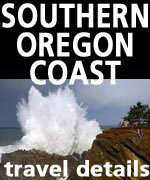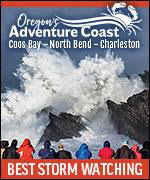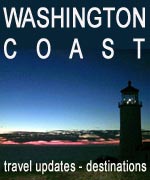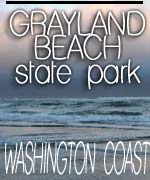Great Big Meteor Shower for Oregon, the Coast - Beware Rumors, However (Video)
Published 08/07/2017 at 7:53 PM PDT - Updated 08/08/2017 at 6:53 AM PDT
By Oregon Coast Beach Connection staff
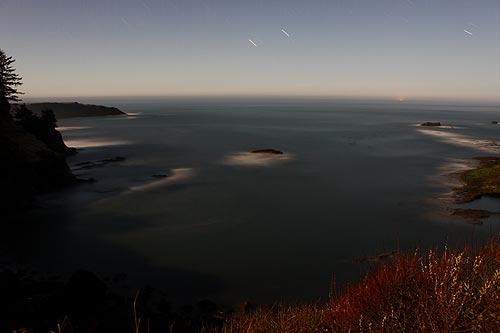
(Oregon Coast) – One of the biggest meteor showers of the entire year is starting to light up skies over Oregon and the Oregon coast, but it's also the target of some ridiculous fake news. (Above: Boiler Bay on the centra Oregon coast. This is only regular star movement - not a meteor shower - but it can look like this to the naked eye at times).
The Perseid meteor shower hits its peak on August 11 and 12, although it won't be as bright as usual. That's in spite of a wacky article that's gone mega-viral from something called physics-astronomy.com that claims this one will be the “brightest in all of human history,” which has also then been picked up by other sites of nebulous credibility.
Snopes and NASA have declared it a hoax, but one that unfortunately everyone seems to be caught up in.
Sadly, the waning moon is going to put a dent in your viewing of this shooting star display. NASA said rates will be about half of what they are normally. Usually, you can see 80 to 100 of these streaks of light per hour at Perseid peaks. This time around it will be more like 40 to 50.
“In 2017, the Perseids will be a little more difficult to see due to the presence of the waning gibbous moon and will rise shortly before the shower hits its peak around midnight,” said Jim Todd, astronomy expert at OMSI.
Includes exclusive listings; some specials in winter
In Cannon Beach:
Includes rentals not listed anywhere else
In Manzanita, Wheeler, Rockaway Beach:
Some specials for winter
In Pacific City, Oceanside:
Some specials for winter
In Lincoln City:
Some specials for winter
In Depoe Bay, Gleneden Beach:
Some specials for winter
In Newport:
Look for some specials
In Waldport
Some specials for winter
In Yachats, Florence
Some specials for winter
Every year, the Earth passes through one debris field or another made up of chunks left behind by comets that are zipping through the solar system. The result of this intersection is a meteor shower.
“Caused by small bits of interplanetary rock and debris called meteoroids that crash and burn up high in Earth's upper atmosphere, they travel at thousands of miles per hour and quickly ignite in the atmosphere’s friction, 30 to 80 miles above the ground,” Todd said. “Most are destroyed during entry; the rare few that survive and hit the ground are known as meteorites.”
The Perseid shower is the most well-known of the bunch. The debris field that creates them comes from the leftovers of the comet Swift-Tuttle during its last trip past the sun in December 1992, Todd said. As they get closer to the sun, they shed a stream of dust and ice. If the Earth wanders through that leftover stream, we here on Earth get quite the show.
“Depending on where Earth and the stream meet, meteors appear to fall from a particular place in the sky known as the radiant,” Todd said. “In the case of the Perseid meteor shower, the radiant takes place in the constellation Perseus. The Perseid meteor shower has a very long duration: from about July 15th through August 25th.”
There have been some incredibly bright shooting stars in recent weeks, with numerous people in Oregon reporting unusually luminous lobs of lights from the skies. One especially bright one happened on July 31. It was captured on video in Washington, but reported all around Oregon, including the north coast town of Astoria.
Oregon Coast Beach Connection staff saw another incredibly bright one in Portland late last week.
So are these a sign this meteor show will be bright after all?
Not so, Todd said. They are merely coincidence. Random, unusually bright meteors happen on occasion.
For the best viewing, get out of city lights and to a place with as few obstructions as possible. Oregon Coast Lodgings for this event - Where to eat - Maps - Virtual Tours
“Meteor watching is an unaided-eye event but binoculars are handy for watching trails (persistent trains) that may hang in the sky for one or more seconds after a meteor's passage,” Todd said.
If cloud cover permits, much of the Oregon coast will be prime viewing for this. Especially higher up areas like Neahkahnie Mountain by Manzanita, Ecola State Park at Cannon Beach, or the overlooks between Cape Perpetua and Yachats.
OMSI will be hosting two Star Parties on Saturday, August 12 for the Perseid Meteor Shower Watch. One happens in the Oregon coast range.
Hundreds of star lovers from across the Pacific Northwest will be meeting at both Rooster Rock State Park and Stub Stewart State Park at 9 p.m. to watch and enjoy the wonder of the Perseid Meteor Shower. The event, sponsored by OMSI, Rose City Astronomers, and Oregon Parks and Recreations will have telescopes set up for attendees to use. OMSI staff will be presenting informal talks about the meteor shower, constellations, and the summer sky.
Rooster Rock State Park is located 22 miles east of Portland on I-84 just east of Sandy River at exit 25. To reach L.L. "Stub" Stewart State Park, take US-26 west of Portland and turn right on OR-47. The event starts at 9:00 pm and is free with $5 parking per vehicle. Warm clothing and a flashlight with red light are recommended. Personal telescopes and binoculars are welcome.
On the scheduled day of each OMSI Star Parties, it is suggested that interested visitors check with OMSI's website for possible weather-related cancellations.
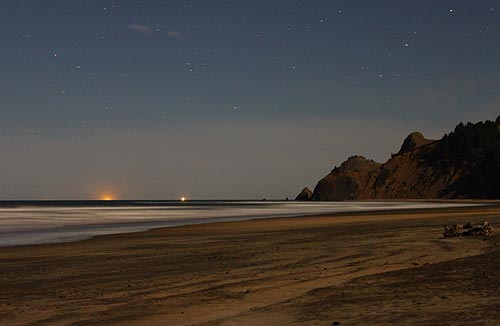
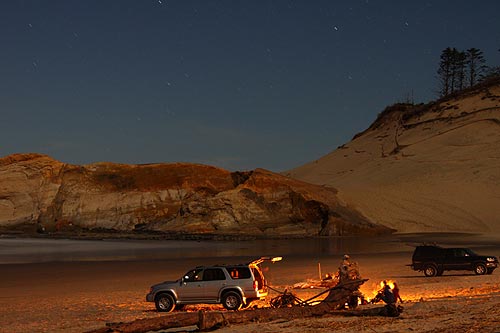
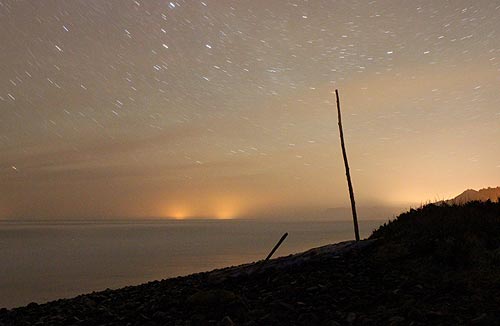
Cannon Beach Lodging
Nehalem Bay Lodgings
Manzanita Hotels, Lodging
Three Capes Lodging
Pacific City Hotels, Lodging
Lincoln City Lodging
Depoe Bay Lodging
Newport Lodging
Waldport Lodging
Yachats Lodging
Oregon Coast Vacation Rentals
Oregon Coast Lodging Specials
More About Oregon Coast hotels, lodging.....
More About Oregon Coast Restaurants, Dining.....
LATEST Related Oregon Coast Articles
Likely just before dawn best hour but peak happens during daylight. Weather
Dark Sky Week is Prime Along Oregon Coast: Where and Where Not to Go
General guide to dark sky viewing from south to north coast. Astronomy
Sizable Price Drop, Deals in Lincoln City During Quiet of April on Central Or...
20 perc off at A1 Vacation Rentals across its roster, including Gleneden Beach. Lincoln City specials
Upcoming S. Oregon Coast Events Include Gem Show, History: Coos Bay, Bandon
May 6 talk at Coos History Museum, Mayfly Fest May 17, Bandon Rock / Gem Show June 7,8
Washington Coast Cleanup on April 19 - Coinciding with Oregon Coast's SOLVE E...
From the Puget Sound to Long Beach, alongside Oregon's cleanup. Washington coast events, Seaside events
Astoria's Riverwalk Gets New Lighting, More N. Oregon Coast Roadwork
Delays coming this summer, but the riverwalk has a new look. Seaside, Cannn Beach
April Gets Even Cheaper Midweek at Depoe Bay, Lincoln City: Oregon Coast Deals
Off-season rates plus more at Keystone Vacation Rentals. Depoe Bay lodging specials, Lincoln City hotel reviews, Newport hotel reviews
Washington Coast Begins Week of Clam Digs, April 12 Through 18
Long Beach, Twin Harbors, Mocrocks and Copalis at different times. Washington coast events
Back to Oregon Coast
Contact Advertise on BeachConnection.net
All Content, unless otherwise attributed, copyright BeachConnection.net Unauthorized use or publication is not permitted









